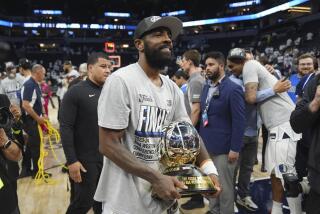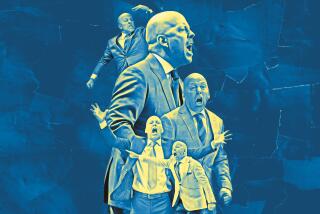THE NEW MOUTH OF THE SOUTH : It Ain’t Braggin’ If It’s So; Ask Miami’s Irvin
- Share via
MIAMI — Michael Irvin, even among those notoriously windy Hurricanes, is considered a gale-force mouth. He talks before games, during games and after. His chatter is constant and, given the adversarial situations he often finds himself in, surprisingly cocky.
“Like when I beat some defensive back,” the wide receiver blithely explains. “I’ll say, ‘Don’t worry about it, I beat everybody.’ Of course, I say it in a nice way. I hate to see a guy down on himself.”
That fully characterizes Irvin’s cheerful arrogance. And this, from his media day exposure, also fits in nicely: “Why don’t you guys just read me my statistics and tell me how good I am, if you all don’t mind.”
It is unfair to Irvin if we don’t report that the above quotes were delivered with a smile that could bridge Biscayne Bay, diminishing the arrogance to a kind of playfulness. He’ll say anything, it’s true, but his wink discourages taking it at face value. Talk is fun but, basically, cheap. He’ll tell you that, too.
It would also be unfair if we didn’t report that Irvin usually backs up what he says. This is just one of those infuriating things--life really isn’t fair--but Irvin is about as good as he contends, else Miami would not be playing Oklahoma for the national championship in the Orange Bowl Friday night.
Even without Vinny Testaverde throwing to him, Irvin has remained a frightening force. Last year, his sophomore season, Irvin caught 53 passes for 868 yards and 11 touchdowns. This season, with sophomore Steve Walsh favoring a shorter and safer passing offense, Irvin has still caught 44 passes for 715 yards and 6 touchdowns.
“I don’t think losing Testaverde has made that much difference,” Oklahoma defensive coordinator Gary Gibbs was forced to conclude the other day. “They still have guys like Irvin who can catch a 10-yard pass and turn it into a 65-yard gain, playmakers.”
So Irvin has been doubly maddening. He catches big passes in big games and then tells you about it. Against Florida State this season, arguably a better team than Miami, Irvin leaped into the sky late in the game to catch two passes, one a 73-yard catch-run for the winning touchdown.
Last year, he helped Oklahoma out of the championship race with two touchdowns. All the while, he was barking at those poor defensive backs.
“Michael Irvin is a great player,” Oklahoma defensive back Rickey Dixon said wearily. “But he will try to talk you out of the game. It’s like being in a bad neighborhood. He’ll talk you out of something if you don’t stand for it.”
So the reputation grows that Irvin is good and loud, or loud and good. A big-play big-mouth, another in a long line of Miami’s reprobates, a little easier to take than most perhaps.
But it is unfair, too, if we don’t report that he hides a world of grief behind that smile. If you penetrate the patter, you find a young man who can’t outdistance the loss of a father, no matter how fast he runs, what route he takes.
“The funny thing about big games,” he says, briefly seeing nothing funny about it at all, “is that they can be both the most exciting and depressing moments in my life. For every 10 minutes of excitement, I go through 2 minutes of depression.”
He looks depressed even as he says it. It doesn’t square with the kid who was just delivering a monologue of classic egomania. Sometimes he even looks confused, wondering why it is only his success that can bring such pointed sadness. But then life really isn’t fair, is it?
“After the game I think, ‘What if my father could have seen that catch? What if he could see me plastered across all the newspapers?’ ” Irvin shakes his head.
Opponents might be surprised to learn that Irvin has a sober side. But, gee, every boy’s father should be able to cheer from the sidelines. Irvin has set Miami records for receptions, yardage and touchdowns, enough to make any dad proud. But Irvin’s dad died four years ago, far short of his son’s blossoming.
It was not just any dad, either. Irvin still keeps a picture of the man he calls Rev in his locker and, even four years later, talks movingly of the impact the man has had on his life. The years have not dimmed the memory of a man who broke his back--”literally broke his back”--to support a household of 17, and then traveled the state of Florida on weekends to preach the Baptist gospel.
“You hear of a man who worked sun-up, sun-down, but just as a figure of speech,” Irvin said. “My father worked-- he worked-- sun-up, sun-down. Twelve hours a day, out on a roof. No man can work that hard. No wonder he died at 57.”
Walter Irvin must have lived a scorched life on Fort Lauderdale rooftops but apparently an uncomplaining one. Discomfort was a comic inconvenience if we can draw much from this anecdote: One Fourth of July, a firecracker went off in his callused hand and he simply laughed.
But Walter Irvin didn’t simply have a hard job. He had two. Late every Friday night he would leave for one of the three Baptist churches he served on a rotating basis. He returned Monday mornings, in time to go roofing.
The church-going never rubbed off on Michael, he admits, but the example of his father’s work habits was profoundly impressive.
And then the tumors began taking their awful toll, and Michael grew up a bit.
“My father was so big and strong all his life,” he said. “But then one day, I guess I was 16, I took him to the doc. I heard him say, ‘I don’t think I can go on.’
“It was the biggest blow of my life. I never thought for a minute that God could take this man. If he could do what he did, 12 hours a day, I knew he could beat it.”
He didn’t. The day before he died, he called Michael in. “It was like a riddle,” Irvin said. “He said, ‘Mike, I might be going home on the morning train.’ I guess I knew what that meant later.”
Irvin’s subsequent senior season in high school was suddenly a spectacular one and he was recruited across the land. But he stayed as close to home as possible. In any event, he couldn’t have remained any closer to his father in these intervening years.
There is evidence that Michael is just one of many--so many!--loons in the family. There was his father’s example of industriousness, of course, but also family seed for the wackiness Michael so happily exhibits.
His family, for example, takes the Miami game tickets and trades down for end zone seats, the better for Michael to race up into the stands after touchdowns.
Well, what can be expected of a family that crowded as many as 19 people into a three-bedroom house, one of those already reserved “so Mom and Dad could make yet more kids,” Irvin reports.
What else can be expected is a yearning for space, end zone or otherwise.
Irvin, who many believe will turn pro on Saturday--he would be a fifth-year student next season--is often reminded of bread-winning responsibilities.
His mother, Stella, a 50-ish matriarch who finds it no trouble to prepare Thanksgiving dinner for 60, including 35 grandchildren and Michael’s own 1 1/2-year-old boy, already has a floor plan for a dream house. She says, “Michael, go out and have a good game and work on my house.”
Irvin takes this seriously. Although his father provided a nice, if small, house through his work, Michael still remembers need, such as when his yearly pair of shoes grew cramped and he was forced to cut the toe sections off, give himself some room. There is no question that he means to put his talents to marketable use, and soon.
This news should really chill those defensive backs. There is some thought that this is merely a kid at play, barking and woofing for the fun of it.
But what if it’s really a grown man, a kind of breadwinner to be? A man with debts to repay, his urgency redoubled even though the primary lender is gone?
Well, you know what those defensive backs are thinking: Life really isn’t fair.
More to Read
Go beyond the scoreboard
Get the latest on L.A.'s teams in the daily Sports Report newsletter.
You may occasionally receive promotional content from the Los Angeles Times.










